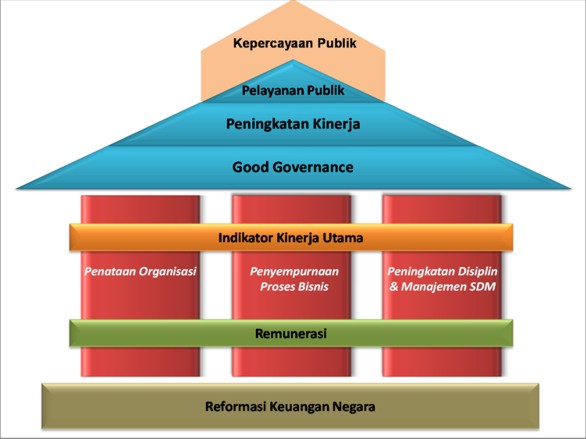As an organization dealing with complex issues, Ministry of Finance requires harmonization to realize its vision and missions. Related to this matter, Ministry of Finance’s leaders took a phenomenal measure by implementing Bureaucratic Reform. Basically, Bureaucratic Reform is an effort to implement basic changes towards the governance system, specifically on institutional (organization) aspect, business process, and human resources (HR).
tiga pilar reformasi birokrasi
From top to bottom:
Public Trust
Public Services
Performance Improvement
Good Governance
Key Performance Indicators
Organization Management
Business Process Improvement
Discipline and HR Management Improvements
Remuneration
State Finance Reform
Ministry of Finance commenced implementing Bureaucratic Reform in 2006. Up to 2009, Bureaucratic Reform was under the Central Bureaucratic Reform Team (TRBP). Subsequently, in 2010, the implementation of Bureaucratic Reform was coordinated by the Bureaucratic Reform Coordination Forum (FKRB) of Ministry of Finance, which was established by Minister of Finance and Unit Bureaucratic Reform Team (TRBU) established by leaders of respective First-Echelon Unit.
Based on Minister of Finance’s Decree Number 65/KMK.01/2010, FKRB’s tasks are coordinating, directing, monitoring, and evaluating Bureaucratic Reform programs implemented in all units in the Ministry of Finance as well as reviewing and preparing the Bureaucratic Transform Agency of Ministry of Finance. FKRB becomes aligning of Bureaucratic Reform Programs, which are merged into the tasks and functions of the related unit.
Bureaucratic Reform in Ministry of Finance keeps going. Starting from the objective to become a service-oriented, accountable, and transparent institution, Bureaucratic Reform in Ministry of Finance has entered half decade. The beginning of 2012 b
ecame an important moment in the history of Bureaucratic Reform when the Ministry of Finance’s Decree Number 185/KMK.01/2012 concerning the Roadmap of Bureaucratic Reform of Ministry of Finance 2010-2014 was passed. This stipulation was a real commitment of Ministry of Finance to continue improving through Bureaucratic Reform.
In addition, this Bureaucratic Reform roadmap was the mandate of Regulation of Minister of Administrative Reform and Bureaucratic Reform Number 20 of 2010 concerning the Bureaucratic Reform Roadmap 2010-2014, which was prepared by Ministry of Administrative Reform and Bureaucratic Reform to be the guidelines of Bureaucratic Reform implementation in the entire Ministries/Institutions and Local Governments in Indonesia. In conjunction with this roadmap ratification, three main pillars as the proponents of Bureaucratic Reform in the Ministry of Finance, which had been applied for 4 years since its inauguration, have changed into 9 programs. Those nine programs are the implementation of 8 areas of change as mandated by the Regulation of Minister of Administrative Reform and Bureaucratic Reform Number 20 of 2010 concerning the Bureaucratic Reform Roadmap 2010-2014. Those nine programs consist of:
(1) Change Management,
(2) Legislation Management
(3) Organization Enhancement
(4) Procedure Management
(5) Structuring of Human Resources Management System
(6) Supervision Enhancement
(7) Performance Accountability Enhancement
(8) Public Service Quality Improvement
(9) Monitoring and Evaluation
The role of Ministry of Finance in national bureaucratic reform is not merely on paper. Ministry of Finance’s performance has continually increased since bureaucratic reform implementation. One of them is reflected in the government revenue increase in terms of taxation, which rises up to 300% from the beginning of bureaucratic reform implementation. Vertical offices have been improved and services are way faster than before. This successful implementation becomes the benchmark for Ministries/Institutions, Local Government even State-Owned Enterprises. This can be seen from many incoming requests for comparative study or knowledge sharing in terms of Bureaucratic Reform implementation in the Ministry of Finance.